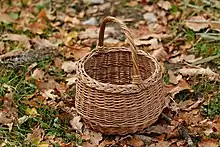kosár
Hungarian

(1) kosár
.jpg.webp)
(5) melltartókosár
.jpg.webp)
(8.2) kosárpalánk
Etymology
Borrowed from a South Slavic language, compare Serbo-Croatian košara, Slovene košara. The meaning “rejection” came into use in analogy with German Korb (“basket; rejection”), which in turn is due to a medieval custom of giving a bottomless basket as a symbol of unrequited love.[1]
Pronunciation
- IPA(key): [ˈkoʃaːr]
Audio (file) - Rhymes: -aːr
- Hyphenation: ko‧sár
Noun
kosár (plural kosarak)
- basket (round lightweight container, especially one that is woven)
- 1896, Dezső Szomory, “Verebek”, in Mesekönyv:
- Aztán gyorsan, kosárral a karján, a piacra sietett.
- Then, with a basket on her arm, she quickly hurried to the market.
- basketful (amount that will fit into a basket)
- shopping basket (basket for carrying merchandise while shopping)
- (by extension, Internet) cart, shopping cart (list of items marked for purchase in an online store)
- bra cup (part of a bra that covers the breast, also used as a measurement of size)
- (in set phrases) rejection, the mitten (typically of a marriage proposal, or refusal to dance)
- the basket of a hot-air balloon, a crane or a crow’s nest
- a concept or object relating to the team sport of basketball
- (colloquial) basketball (sport with the objective of putting a ball through a hoop)
- (basketball) basket (circular hoop from which a net is suspended)
- 1996, Ferenc Deák, “Félrecsúszott magyar győzelmi lehetőségek Atlantában”, in Kapu, volume 9, number 9:
- Nevetséges amikor a góliátok nem bedobják, hanem beteszik a labdát a kosárba.
- It is ridiculous when these giants don’t throw but dunk the ball in the basket.
- (basketball) basket (putting the ball through the basket, thereby scoring points)
- (colloquial) basketball (sport with the objective of putting a ball through a hoop)
Declension
| Inflection (stem in -a-, back harmony) | ||
|---|---|---|
| singular | plural | |
| nominative | kosár | kosarak |
| accusative | kosarat | kosarakat |
| dative | kosárnak | kosaraknak |
| instrumental | kosárral | kosarakkal |
| causal-final | kosárért | kosarakért |
| translative | kosárrá | kosarakká |
| terminative | kosárig | kosarakig |
| essive-formal | kosárként | kosarakként |
| essive-modal | — | — |
| inessive | kosárban | kosarakban |
| superessive | kosáron | kosarakon |
| adessive | kosárnál | kosaraknál |
| illative | kosárba | kosarakba |
| sublative | kosárra | kosarakra |
| allative | kosárhoz | kosarakhoz |
| elative | kosárból | kosarakból |
| delative | kosárról | kosarakról |
| ablative | kosártól | kosaraktól |
| non-attributive possessive - singular |
kosáré | kosaraké |
| non-attributive possessive - plural |
kosáréi | kosarakéi |
| Possessive forms of kosár | ||
|---|---|---|
| possessor | single possession | multiple possessions |
| 1st person sing. | kosaram | kosaraim |
| 2nd person sing. | kosarad | kosaraid |
| 3rd person sing. | kosara | kosarai |
| 1st person plural | kosarunk | kosaraink |
| 2nd person plural | kosaratok | kosaraitok |
| 3rd person plural | kosaruk | kosaraik |
Derived terms
- kosaras
- kosarazik
Compound words
- árbóckosár
- bevásárlókosár
- darukosár
- függőkosár
- gyümölcskosár
- kenyérkosár
- kézikosár
- kézimunkakosár
- kosárcsapat
- kosárlabda
- mózeskosár
- papírkosár
- szájkosár
- szemeteskosár
- szemétkosár
- virágkosár
Expressions
- kosarat ad
- kosarat kap
References
- kosár in Zaicz, Gábor (ed.). Etimológiai szótár: Magyar szavak és toldalékok eredete (‘Dictionary of Etymology: The origin of Hungarian words and affixes’). Budapest: Tinta Könyvkiadó, 2006, →ISBN. (See also its 2nd edition.)
Further reading
- kosár in Bárczi, Géza and László Országh. A magyar nyelv értelmező szótára (‘The Explanatory Dictionary of the Hungarian Language’, abbr.: ÉrtSz.). Budapest: Akadémiai Kiadó, 1959–1962. Fifth ed., 1992: →ISBN
This article is issued from Wiktionary. The text is licensed under Creative Commons - Attribution - Sharealike. Additional terms may apply for the media files.